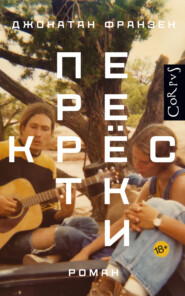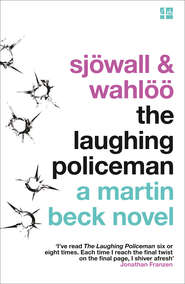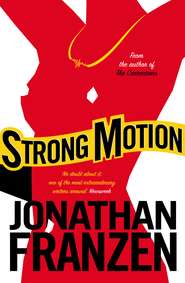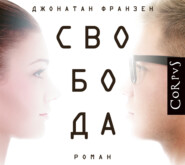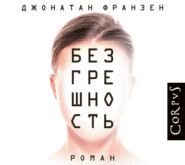По всем вопросам обращайтесь на: info@litportal.ru
(©) 2003-2024.
✖
The Twenty-Seventh City
Автор
Год написания книги
2018
Настройки чтения
Размер шрифта
Высота строк
Поля
“Oh, very funny. A good choice. Your mother loved it.”
“What about you?”
“I liked the Maude character. She was very well done.” He paused. “I’m going to take a shower. Will you be down for lunch?”
Sick of records and TV, she spent the early afternoon simply kneeling by the window, her chin on the cleft between her clasped fingers. The trees were in motion, and puffy white clouds were in the sky. Mr. LeMaster across the street was doing his best to rake leaves. A man in a blue van threw the weekend Post-Dispatch into the driveway. Luisa went down to fetch it.
Her father was on his business line in the study, ordering eighteen beef Wellingtons for some kind of meeting. Her mother was baking in the kitchen. Luisa heard the rolling pin click and the cadences of the three o’clock news.
The air outside was both warm and cold, like fever and chills. Mr. LeMaster, who thought she was spoiled, did not say hello.
She unsheathed the Post and left all of it at the foot of the stairs except for the big funnies and the Everyday section, which had the small funnies. These she took back up to her bedroom and lay down with. She started to turn to the small funnies, but a picture on the first page stopped her. It was a picture of a black man giving the photographer the finger. The credit read: D. Thompson/Post-Dispatch.
Luisa shivered. How could they print a picture like that? And so quickly? Duane had said he hadn’t sold anything.
A FOREST PARK SATURDAY was the page’s headline. Other pictures gave glimpses of anonymous revelers, and in the background of Duane’s picture some kids were playing football on the field by the Planetarium. The lips of the man in the foreground were parted in derision. His finger was aimed at the unseen photographer. Shirts and Skins in the Park, the caption read. Benjamin Brown, foreground, has been unemployed since last November. The man, right, was unidentified.
The man, right, was a hawk-nosed Asian in a turban, a passerby. He was glancing aside so severely that his eyes were all whites. He looked like a blind man.
Eight hours later she and Duane were necking in the rain in Blackburn Park. When the rain got too heavy they went and necked in his mother’s silver Audi, which he’d borrowed for the evening. The windows fogged up solid. People walking by on Glendale Road couldn’t see a thing inside the car.
Luisa was running a temperature, maybe a hundred or a hundred one, but she didn’t feel the least bit sick. It was Duane who kept asking if she had to get home. When she did get home, the house was dark; she was happy she was only an hour late. But as soon as she closed the front door her father ambushed her. First he scared her and then he was horrible to her. She couldn’t understand how anyone could get so pissed off about an hour either way. Before she fell asleep she decided to keep Duane to herself for a while, even if she had to lie.
When she woke up in the morning the sun was shining and the air near her bedroom windows was much warmer than it had been the night before. After breakfast she told her mother she was going out birding with Stacy. She told her father she thought his pants were too short. Then she drove over to University City and picked up Duane, and phoned Stacy from a gas station and asked her to cover for her.
In the middle of the big field in Washington State Park she spread a blanket and lay down. Half a mile away, further up the Big River valley, smoke was uncoiling from dying fires. Campers were pouring water on the coals, packing tents into trunks. For them it was the hour of damp sleeping bags and desolation, their thoughts turning to tomorrow’s practicalities while Luisa beamed in the sun. Her new boyfriend’s eyes were bright. He’d slept well, he said. He’d brought a camera, a larger one, a Canon.
“Psh-psh-psh-psh-psh-psh-psh-psh-psh-psh.”
“What’s that?”
“Birds like it,” she said. “Psh-psh-psh-psh-psh-psh-psh. Psh-psh-psh-psh-psh-psh-psh-psh.”
“What birds?”
“All birds. They get curious. They wonder what it is. Look!” She pointed to a red-and-white flash in the willow grove.
“What?”
“Rufous-sided towhee. It’s one of my favorites.”
“How many—”
“Sh! Sh-shh-shh-shh-shh-shh-shh-shh.”
“How many species do you know?” Duane whispered.
“I’ve seen a hundred twelve this year. I’ve got about a hundred and fifty on my lifetime list. Which isn’t very many, really.”
“It sounds like a lot.”
“Does it?” She leaned into him and toppled him. “Does it? Does it?” Sickness and medicine made her feel spread out, a warm smothering blanket. “Does it? Does it?” She spread her arms and legs to mirror his. His hard-on pressed on her hipbone. They lay still for a long time. Luisa could see herself and how she lay and looked from a perspective that would have been impossible if her parents had known who she was with. At this very minute in Webster Groves her mother was working on dinner and her father was watching football. They expected her back before long.
“Listen!” Duane shifted beneath her.
Geese were honking. She rolled over and saw a V of Canadas heading south. She sneezed from the sun and wool dust.
“Sit up for a second,” Duane said. He was screwing a stumpier lens onto the camera.
“You mean gesundheit.”
He lay on his stomach and took half a dozen pictures. “What kind of geese are those?”
She turned to double-check.
“Don’t look. Smile. Wipe that mustache off your face.”
She smiled at the receding geese. “Am I going to be in the paper?”
“Smile. You’re a dream. At me.”
“At you?” She stopped smiling and looked at him. “What for?”
“So nobody gets the idea they’re looking at anything but a picture. I want there to be an implied photographer.”
“I guess you’ve got it all figured out,” she said.
“I guess I do.”
“Is that what you told the Post-Dispatch?”
“I didn’t tell them anything. I went down there with some prints and they gave me the runaround. And then yesterday morning, like, you’re putting me on the payroll? I thought they were going to say they’d lost my pictures.”
“You’re really lucky.”
“I know. You’re my lucky star. I can pay the rent now.”
Rent? What a bizarre concept. Pay the rent. What a boring concept.
“Do you like me?” she said.
“What do you think?”
“Why do you like me?”
“Because you’re smart and you’re pretty and you came along at the right time.”
“Do you want to go back to your apartment?”







